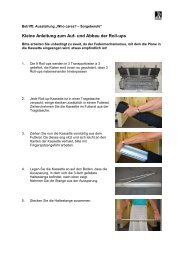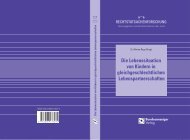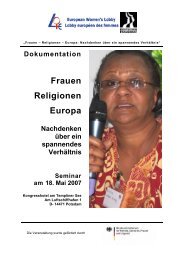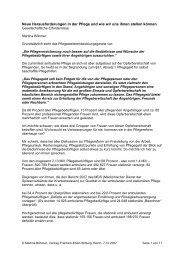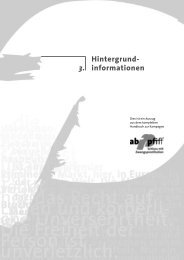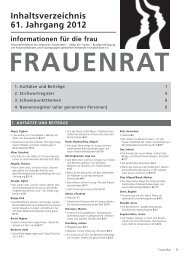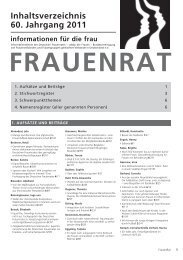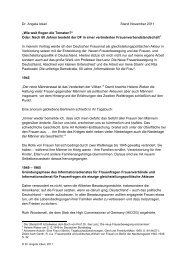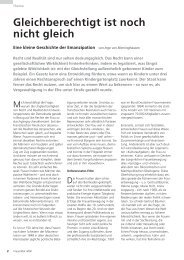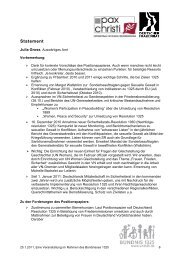Abpfiff - Deutscher Frauenrat
Abpfiff - Deutscher Frauenrat
Abpfiff - Deutscher Frauenrat
Erfolgreiche ePaper selbst erstellen
Machen Sie aus Ihren PDF Publikationen ein blätterbares Flipbook mit unserer einzigartigen Google optimierten e-Paper Software.
10<br />
Every signature counts<br />
From 8 March to 31 October 2006, around 180,000<br />
signatures were collected in support of the<br />
campaign‘s urgent policy recommendations –<br />
including around 100,000 from Catholic women‘s<br />
organisations. The latter group shared the campaign‘s<br />
concern, but did not support the following statement<br />
from the introduction to the policy recommendations:<br />
“Existing rights for prostitutes need to be expanded<br />
in order to improve working conditions, to ensure<br />
that services are voluntary and independent, and to<br />
combat social stigma. We have to make sure that<br />
the human rights of prostitutes are upheld, and that<br />
prostitutes themselves are treated with respect by<br />
society at large and by their clients in particular.“<br />
The Catholic women‘s organisations prepared<br />
their own flyers excluding this statement, but<br />
including all of the policy recommendations.<br />
Wherever activists campaigned, they received<br />
primarily positive responses from men as well as<br />
women. Defensive reactions or vulgar remarks<br />
were rare exceptions. It was clear that many people,<br />
including visitors from other countries, had already<br />
heard about the campaign from the media.<br />
On 16 January 2007, the signatures will be presented<br />
to the Office of the President of the German<br />
Parliament; here they are accepted by Susanne<br />
Kastner, Vice President of the German Parliament.<br />
Human trafficking<br />
Human trafficking is a serious crime whose<br />
victims number around 2.4 million women,<br />
men and children worldwide every year, as<br />
estimated by a study published in 2005 by the<br />
International Labour Organization (ILO).* Human<br />
trafficking brings estimated annual profits<br />
of around 32 billion US dollars. It accounts for<br />
a significant share of organised crime, and is<br />
usually linked with other serious violations.<br />
In Palermo in 2000, the UN adopted the “Protocol to<br />
prevent, suppress and punish trafficking in persons,<br />
especially women and children“, known as the<br />
“Palermo Protocol“ for short. Human trafficking<br />
has since had a standard international definition,<br />
namely the recruitment, transportation, transfer,<br />
harbouring or receipt of persons, by means of the<br />
threat or use of force or other coercion, of abduction,<br />
fraud, or deception, for the purpose of exploitation.<br />
In Germany, a new law passed in 2005 assigned<br />
human trafficking to violations of personal liberty. The<br />
definition of human trafficking in the German Penal<br />
Code was modified and made more comprehensive<br />
in accordance with international guidelines: §232<br />
defines “human trafficking for the purpose of sexual<br />
exploitation“, and §233 defines “human trafficking<br />
for the purpose of labour exploitation“. Basic cases of<br />
human trafficking are punishable by prison sentences<br />
of six months to ten years, and aggravated cases (e.g.<br />
involving children, serious physical abuse, civil or<br />
criminal racketeering, force, credible threat of injury,<br />
or deception) by sentences of one to ten years. Due<br />
to the criminal nature of human trafficking, it is the<br />
duty and obligation of the state (in particular the<br />
police and prosecutors‘ offices) to investigate human<br />
trafficking crimes and to prosecute the perpetrators.<br />
* ILO: A global alliance against forced labour, Geneva 2005



